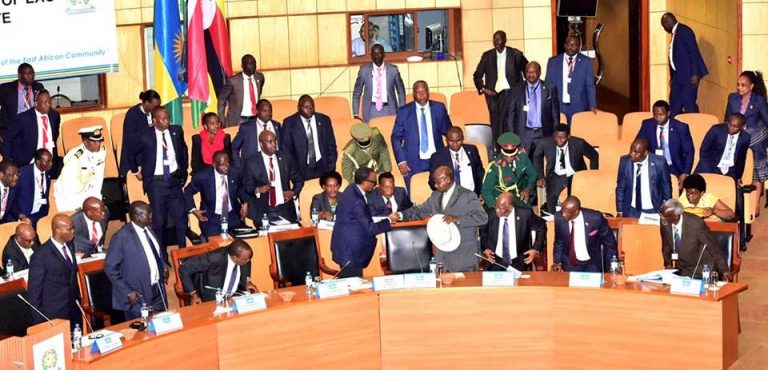
Rwandan president Paul Kagame on Friday took over chairmanship of EAC Summit of Heads of State and Government from his Ugandan counterpart Yoweri Museveni who has been the head since May 2017 when he replaced President John Magufuli of Tanzania. (File photo: VCG)
Four East African presidents met on Friday for the regional Heads of State annual summit in Arusha, Tanzania, where they pledged to develop better conditions that engender private-sector led economic development.
John Magufuli, the president of Tanzania, Paul Kagame of Rwanda, Yoweri Museveni of Uganda and Uhuru Kenyatta of Kenya met in the capital city. Burundi President Pierre Nkurunziza sent his first vice-president, Gaston Sindimwo, while South Sudanese leader Salva Kiir was represented by his Trade, Industry and East African Affairs minister Paul Mayom Akec.
The push for innovative policies to support entrepreneurs comes against a backdrop of low cross-border trade between the five countries. Recent data shows that intra-East African Community stood at only 40 percent in 2017, while a trade and investment draft report by the group's secretariat shows that the value of trade within the block fell by 15 percent to $4.4 billion in 2016, from $5.1 billion in 2015.
"The private sector cannot fully participate in regional economic growth if the cost of doing business is not reduced," said Museveni, the summit's outgoing chairman.
The high cost of electricity and transport are to blame, he said.
"Nevertheless we are investing in new energy projects to boost access of affordable electricity while expanding the transportation network," said Museveni, referring to the standard gauge railway from Kenya that will connect the port city of Mombasa with Nairobi, Kampala in Uganda and Kigali in Rwanda. Tanzania is also in the process of building a high-speed electric train.
Moreover, he said access to affordable credit also needs to be addressed.
Integration is key to continental growth
On his part, incoming chairman Kagame said the member states need to address the barriers of growth to confidently move forward.
"Africa is seriously pushing ahead with integration, an essential building block towards achieving a single market. We cannot afford to be left behind. Nothing should hold us back from our commitments for our collective good in trade, infrastructure, industrialization and security," he said.
Kagame added that the East African Community is people-centered and all decisions should reflect this. "We will measure our success by how easily people move their products and capital across the borders and how prosperous they become as a result."
The business community has in the recent past decried the high number of tariff and non-tariff barriers that limit intra-regional trade. Nevertheless, according to a report by the council of ministers, out of 62 non-tariff barriers, 45 have been resolved while 17 are still under discussion.
On the downside, expectations of entrepreneurs to increase local participation in motor vehicle assembly and textile and leather manufacturing were tempered down when the summit failed to conclude the matter and instead directed the council to table a follow-up report in the next summit.
Last year, the heads of state agreed to look into developing the local automotive industry by reducing importation of second-hand cars that account for 70-85 percent of the East African Community total market.
Moreover, in 2015, the block announced that second-hand clothes and shoes would be banned from the markets starting this year to strengthen the textile and leather industry. But a compromise was reached following complaints raised by the US that this would go against the African Growth and Opportunity Act agreement. The leaders finally agreed to only increase taxes.
In the joint communique read by the group's Secretary-General Liberat Mfumukeko, the leaders endorsed Kenya’s candidature for non-permanent membership on the United Nations Security Council for a two-year term for the period 2021-2022. Outstanding issues included admission of South Sudan and Somalia into the East African Community block.
The region will mark the 20th anniversary of its revival later this year.


